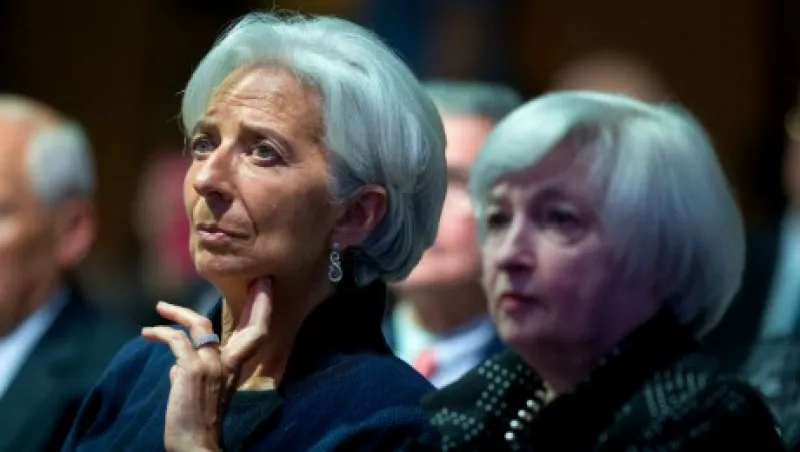As the Federal Open Market Committee meeting gets underway today, global financial markets continue to be jittery, with a sell-off in equity and fixed-income markets in Europe as well as in futures for U.S. stocks. The Greek drama continues to weigh heavily on investor sentiment, though some are still holding on to hope of a last-minute deal. Among them are a group of Société Générale economists, who wrote this morning in a note to clients, “We believe...that negotiations will last until the last minute — i.e. the European Union Summit on June 25–26.”
Europe braces for Greek default. With the government of Greek Prime Minister Alexis Tsipras digging its heels over creditor-demanded concessions, members of the European Commission and the European Central Bank have begun to discuss openly contingency plans for a default scenario. The Wall Street Journal today cited anonymous sources suggesting that policymakers in the EU are considering a scenario in which Greece could remain on the euro despite a default.
Toyota investors approve new capital raise. Shareholders of Japanese automotive giant Toyota Motor Corp. voted in favor of a new offering of initially nontrading preferred shares that will carry voting rights. The company’s plan to issue up to 50 million of the new class of shares exclusively to investors in Japan had drawn criticism from many foreign institutional investors.
Honda to recall 1.39 million cars. Honda Motor Co. is asking owners of more than 1 million Accord and Civic sedans to return their cars to dealers for repair in connection with the recall on the cars’ front passenger-side air bags, manufactured by Japan’s Takata Corp. This marks the second recall within two weeks announced by Honda. The Japanese carmaker has been under pressure from U.S. regulators over the allegedly faulty safety devices. A lawsuit filed this month claimed the seventh death related to the Takata air bags, in which a 22-year-old woman driving a 2005 Civic received fatal injuries in an April 2015 accident.
U.K. deflation on hold. The U.K. Office for National Statistics (ONS) today released consumer inflation index levels that indicate that the country ceased to experience deflation in May. Headline consumer prices rose by 0.1 percent versus the same month last year or 0.2 percent for the month while retail-specific prices fell short of expectations at 1 percent year-over-year.
German sentiment plummets. June ZEW economic sentiment index levels, released today, registered at 31.5 versus a prior 41.9 in May, significantly lower than consensus forecasts and the lowest level in seven months. The current situation subindex also came in lower than anticipated, at 62.9 after registering 65.7 in May.
Congressional bill to remove labels on meat passes House. Last week the U.S. House of Representatives passed a bill that would remove country-of-origin labeling requirements on fresh meat. The bill follows a series of rulings against the U.S. by the World Trade Organization over labeling practices for imported foodstuffs.
Portfolio Perspective: Don’t Be Fooled by Today’s U.K. Inflation Data — Kevin Doran, Brown Shipley
Investors shouldn’t be fooled into thinking today’s ONS figures paint an accurate picture of the state of U.K. inflation. If you look in the right places, it’s perfectly clear that there is an abundance of inflation — particularly in asset prices — with talk of bubbles in house, bond and equity markets not farfetched.
With inflation rebounding out of negative territory, we could now see a steady rise as asset price inflation filters across and into real-world inflation. Importantly however, I haven’t seen markets pricing a further rise and its potential risks correctly. I, for one, am avoiding fixed income, in part because of naive inflation projections.
Until the models behind our monthly inflation figures represent real-world inflation and asset price inflation, these figures mask the truth and shouldn’t be taken as a starting point from which to make investment decisions.
Kevin Doran is the chief investment officer at Brown Shipley in Manchester.






